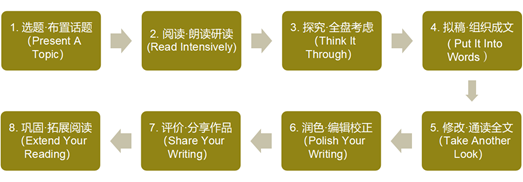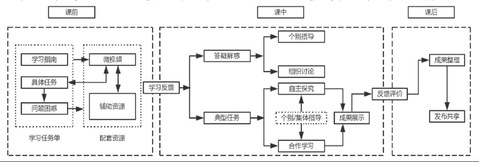课程概述
博士生公共英语混合式课程总课时为48学时,课程设置8个教学主题,英语思辨阅读主题均紧扣全球经济、教育、文化相关热点话题。主题阅读及拓展阅读文章均从世界各大纸媒及网络媒体中精心挑选,力求多视角剖析热点话题。通过倡导“为写而读”的教学理念,让学生在表达中真正做到言之有物;通过大量输入正确表达,让学生在学术写作中做到措辞严谨,表达规范。在教学中,提倡“探究”与“分享”,让人机对话成为学习的助推器。课程结构如下:

教学目标
本课程在增强学生国外期刊及学术文献阅读能力的同时,注重发展学生的思辨能力、国际学术英语交流能力和跨文化交际能力,以使学生能够有效地阅读本专业的国外英文文献、撰写英语学术论文、参与国际学术交流等。
教学流程

课前:自主学习
1. 教师提前一周通过微信公众号发布每周学习任务单和学习资源。
2. 学生登陆“中国大学MOOC”网(https://www.icourse163.org/),搜索“博士生公共英语思辨阅读”课程,登陆课程并完成注册(账号格式为:“实名+福师大博士”)。
3. 学生在规定时间内登陆《博士生公共英语思辨阅读》在线开放课程,观看教学视频、深度阅读主题篇章、完成阅读思考练习、参与主题论坛讨论。
课中:课堂研讨
1. 教师就本周主题所涉及的思辨话题进行多视角剖析,为学生答疑解惑。
2. 教师安排典型任务,要求每组学生在课堂上通过自主探究和协作学习在规定时间内完成,每组完成任务后分别展示学习成果,教师现场进行反馈评价。
课后:巩固学习
1. 学生需要提交经过小组集体打磨的主题习作到《博士生公共英语思辨阅读》在线开放课程平台。
2. 教师对学生提交的主题习作进行筛选,优秀习作将作置顶推荐分享。
免修免考
具体参见《福建师范大学非英语专业研究生公共英语课程免修规定》
研究生院
公共外语教研部
2023年8月24日
附件:
福建师范大学《博士生公共英语》混合式教学进度安排(2023-2024学年第一学期)
总课时:48节,其中线上学习24节,线下面授24节
授课班级:2023级博士研究生(仓山校区)
任课教师:林明金教授
授课时间:星期日上午1-4节
面授地点:仓山校区文科楼201
慕课网址:https://www.icourse163.org/ (中国大学MOOC网)
说明:每次上课时间为4节,每周授课一次,线下面授时学生需全部到指定上课教室参加面授。
序号 | 教学内容 | 内容呈现方式 |
第1次
第1-2节线下面授,第3-4节线上观看课程导学视频 | 第一讲课程导学(阅读·思考·表达:三大核心学习力培养) |
第1-2节 线下面授
|
1.1思辨阅读 | ||
1.1.1为何倡导思辨阅读? | ||
1.1.2 如何开展思辨阅读? | ||
1.2多面思维 | ||
1.2.1 多面思维:词汇视角 | ||
1.2.2 多面思维:交际视角 | ||
1.3创意表达 | ||
1.3.1 创意表达:写作 | ||
1.3.2 创意表达:演讲 | ||
第2次
线上观看视频、阅读相关文章、完成阅读思考题,合计4节 | 第二讲 主题阅读:不颠覆,无创新?(Disruptive Innovation) |
|
2.1 阅读输入 |
| |
(1)What is Disruptive Innovation? | PDF文件 | |
(2)Disruptive Genius Clayton Christensen | PDF文件 | |
(3)观看视频: “不颠覆 无创新”(《对话》) | 视频文件 | |
(4)拓展阅读:Finding the innovation edge | PDF文件 | |
(5)思考题 | 系统测试 | |
2.2 阅读思考 | 教学视频 | |
第3次
线下面授4节 | 2.3 阅读输出 |
第1-4节 线下面授 |
(1)主题讨论 讨论题1:What is disruptive innovation? 讨论题2:Give an example to show how the theory of disruptive innovation doesn’t apply to all businesses and explain the reason that account for it. 讨论题3:What is the dilemma companies confront as far as sustaining and disruptive innovations are concerned? | ||
(2)书面表达 Which do you prefer, traditional cars or electric cars? Why? | ||
(3)讨论题 Disruptive Innovation: Angel or Devil? | ||
第4次
线上观看视频、阅读相关文章、完成阅读思考题,合计4节 | 第三讲 主题阅读:我们的教育使命(Our Educational Mission) |
|
3.1 阅读输入
|
| |
(1)Inaugural Address:Our Educational Mission | PDF文件 | |
(2)Both tradition and innovation mark the inauguration | PDF文件 | |
(3)观看视频:Inauguration of Peter Salovey as Yale University's 23rd President | 视频文件 | |
(4)拓展阅读:Emotional Intelligence Why It Can Matter More Than IQ | PDF文件 | |
(5)拓展视频:哈佛大学校长2018年毕业典礼演讲 | 视频文件 | |
(6)思考题 | 系统测试 | |
3.2 阅读思考 | 教学视频 | |
第5次
线下面授4节 | 3.3 阅读输出 |
第1-4节 线下面授 |
(1)主题讨论 讨论题1:What do you think is the relationship between Yale and Harvard? Is the relationship more of rivalry or more of partnership? 讨论题2:A successful education system - public or private - requires involvement from home. Do you agree? | ||
(2)书面表达 Do you agree or disagree with the following statement? All the money in the world won't boost student achievement if parents make no effort to instill in their children the values of hard work and delayed gratification——Barack Obama Use specific reasons and details to support your answer. | ||
(3)讨论题 What do you think is the mission of higher education? | ||
第6次
线上观看视频、阅读相关文章、完成阅读思考题,合计4节 | 第四讲 主题阅读:纸媒已死?(Are We Ready For the End of the Newspaper?) |
|
4.1 阅读输入 |
| |
(1) Are We Ready For the End of the Newspaper? | PDF文件 | |
(2) Is This the End of News | PDF文件 | |
(3) A New Chapter | PDF文件 | |
(4) 拓展阅读:Where is the journalism we need going to come from now | PDF文件 | |
(5)思考题 | 系统测试 | |
4.2 阅读思考 | 教学视频 | |
第7次
线下面授4节 | 4.3 阅读输出 |
第1-4节 线下面授 |
(1)主题讨论 讨论题1:Do you think Internet provides an opportunity for media revolution? 讨论题2:To what extent do you agree or disagree that “society doesn’t need newspaper. What we need is journalism”? | ||
(2) 书面表达 Are We Ready For the End of the Newspaper? | ||
(3)讨论题 What do you think is a way out for traditional news media in the era of Internet? | ||
第8次
线上观看视频、阅读相关文章、完成阅读思考题,合计4节 | 第五讲 主题阅读:科学真的危险吗?(Is Science Dangerous?) |
|
5.1 阅读输入 |
| |
(1)Is Science Dangerous | PDF文件 | |
(2)Genetically modified food helpful or harmful | PDF文件 | |
(3)观看视频:GENETICALLY MODIFIED FOOD | 视频文件 | |
(4)拓展阅读:Genetically Modified Food | PDF文件 | |
(5)思考题 | 系统测试 | |
5.2 阅读思考 | 教学视频 | |
第9次
线下面授4节
| 5.3 阅读输出 |
第1-4节 线下面授 |
(1)主题讨论 讨论题1:One should not abandon the possibility of using a scientific idea to do good because one could use the same idea to do bad. Do you agree? Why? 讨论题2:Should a scientist be responsible for the results of his or her work? 讨论题3:Should cloning of human beings be banned? | ||
(2)书面表达 Genetically Modified Food: Harmful or Helpful? | ||
(3)讨论题 Is Science Dangerous? | ||
第10次
第1-2节线上观看视频、阅读相关文章、完成阅读思考题,同时完成主题讨论及书面表达,合计4节
| 第六讲 主题阅读:改变世界的力量(The Power of the Idea) |
|
6.1 阅读输入 |
| |
(1)Could Elon Musk Be the Next Steve Jobs | PDF文件 | |
(2)The key challenge to Tesla | PDF文件 | |
(3)观看视频:What Made Steve Jobs Unique | 视频文件 | |
(4)观看视频:Steve Jobs在斯坦福大学的演讲 | 视频文件 | |
(5)拓展阅读:Steve Jobs在斯坦福大学的演讲(双语) | PDF文件 | |
(6)思考题 | 系统测试 | |
6.2 阅读思考 | 教学视频 | |
6.3 阅读输出 |
| |
(1)主题讨论 讨论题1:What traits are shared by Elon Musk and Steve Jobs? 讨论题2:How will you define “Being successful”? | 教学视频 | |
(2) 书面表达 How do you understand “Stay hungry. Stay foolish”? | 教学视频 | |
(3)讨论题 Could Elon Musk Be the Next Steve Jobs, and Tesla Motors the Next Apple? | 教学视频 | |
第11次 第1-2节线上观看视频、阅读相关文章、完成阅读思考题,同时完成主题讨论及书面表达,合计2节
线下面授2节
| 第七讲 主题阅读:科学怎么啦?(How Science Goes Wrong) |
第3-4节 线下面授 |
7.1 阅读输入 | ||
(1)How science goes wrong | ||
(2)How Evil is Tech | ||
(3)When Genetic Diseases Threaten Patient Privacy | ||
(4)思考题 | ||
7.2 阅读思考 | ||
7.3 阅读输出 | ||
(1)主题讨论 讨论题1:What is science supposed to do? But now what is going wrong with science? What is the harm that this tendency may lead to? 讨论题2:What research protocols are necessary in academic life? | ||
(2) 书面表达 “Knowing what is false is as important to science as knowing what is true”. How do you understand “success and failure” in scientific research? | ||
(3)讨论题 How Science Goes Wrong? | ||
第12次
线上观看视频、阅读相关文章、完成阅读思考题,同时完成主题讨论及书面表达,合计2节
线下面授2节
| 第八讲 主题阅读:何为中国梦?(What is the Chinese Dream?) |
第3-4节 线下面授 |
8.1 阅读输入 | ||
(1)How is the Chinese Dream changing the world | ||
(2)What is the Chinese dream | ||
(3)The Power and Potential of the Chinese Dream | ||
(4)观看视频:习近平治国方略之合作共赢(英文版) | ||
(5)思考题 | ||
8.2 阅读思考 | ||
8.3 阅读输出 | ||
(1)主题讨论 讨论题1:What leads to China’s success? In what way can China achieve greater success? 讨论题2:How is the Chinese Dream changing the world? | ||
(2)书面表达 What are the differences between Chinese dream and American dream? | ||
(3)讨论题 What is the Chinese dream? | ||
| 学业测试(总评成绩=线下笔试70%+线上学习30%) 线下笔试满分为100分,题型包括翻译题、论述题等。 线上学习满分为100分,须观看视频、阅读文章、完成系统测试、参与论坛讨论、提交作业等。 |
|


